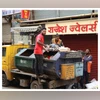With the Swachh Bharat Abhiyan marking its 10th anniversary, the government is now planning to expand its efforts, focusing not only on eliminating open defecation but also on more comprehensive sanitation and waste management strategies, a senior official has said.
The Swachh Bharat Abhiyan is a country-wide campaign initiated by the government in 2014 to eliminate open defecation and improve solid waste management and to create open defecation free villages.
Asked about the road ahead, Vini Mahajan, Secretary, Department of Drinking Water and Sanitation, Ministry of Jal Shakti, said they are now planning to expand its efforts.
"Sanitation began as a journey to free the country from open defecation, recognising that this practice was a significant curse we needed to eliminate. While progress has been made, there is still an ongoing need to identify families who lack toilets and ensure they receive them. It's equally important to keep existing toilets functional," the official said.
She emphasised the importance of catering to specific needs, such as providing accessible toilets for people with disabilities, and highlighted ongoing discussions with state governments to address these nuances.
Also Read
"Behaviour change remains a critical component of the campaign. When the whole government works together to emphasise these points, we see significant changes, which our independent assessments confirm are happening in a sustainable manner," she added.
The next phase of the Swachh Bharat Abhiyan aims to enhance solid and liquid waste management across both urban and rural areas.
The issue of faecal sludge management is being tackled, with efforts being made to ensure that waste from toilets does not end up in open drains, she said.
"A lot of work is going into properly managing faecal sludge and setting up treatment facilities like STPs (Sewage Treatment Plants) and FSTPs (Faecal Sludge Treatment Plants)," the official said.
In addition, there is a significant push toward better liquid waste management, particularly in terms of grey water reuse and recycling.
Solid waste management is also a key focus, especially in rural areas.
"In cities, we know there is an emphasis on segregation at source, but in rural areas, this is still an emerging practice. However, with 5 lakh vehicles for waste collection and over 3.5 lakh segregation sheds already established, progress is being made," she said.
"The government is also encouraging panchayats to adopt resolutions to avoid single-use plastics and promote composting of organic waste.
"We are seeing panchayats actively working on creating value chains for dry waste and promoting the reuse of plastic. Around 3,000 units have already been set up for plastic waste reuse," Mahajan said.
"As Swachh Bharat moves forward, engaging all stakeholders is crucial," she said, adding the government is collaborating with youth, women, community leaders, and startups to introduce new technologies and innovations.
"We are working to ensure that sanitation becomes everyone's business, making sure the entire ecosystem is involved," the official said.
(Only the headline and picture of this report may have been reworked by the Business Standard staff; the rest of the content is auto-generated from a syndicated feed.)

)